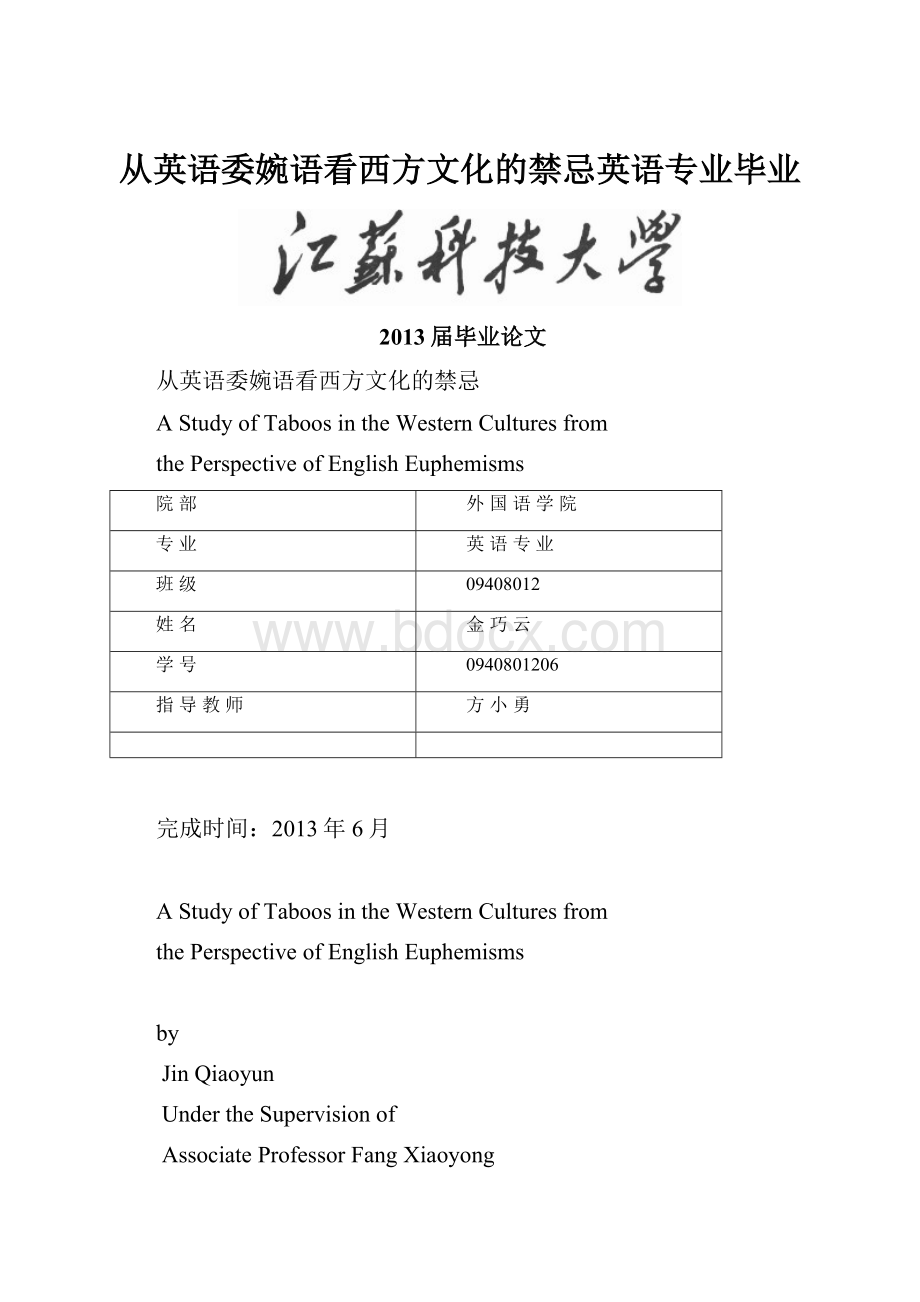从英语委婉语看西方文化的禁忌英语专业毕业.docx
《从英语委婉语看西方文化的禁忌英语专业毕业.docx》由会员分享,可在线阅读,更多相关《从英语委婉语看西方文化的禁忌英语专业毕业.docx(14页珍藏版)》请在冰豆网上搜索。

从英语委婉语看西方文化的禁忌英语专业毕业
2013届毕业论文
从英语委婉语看西方文化的禁忌
AStudyofTaboosintheWesternCulturesfrom
thePerspectiveofEnglishEuphemisms
院部
外国语学院
专业
英语专业
班级
09408012
姓名
金巧云
学号
0940801206
指导教师
方小勇
完成时间:
2013年6月
AStudyofTaboosintheWesternCulturesfrom
thePerspectiveofEnglishEuphemisms
by
JinQiaoyun
UndertheSupervisionof
AssociateProfessorFangXiaoyong
SchoolofForeignLanguages
JiangsuUniversityofScienceandTechnology
June,2013
Acknowledgements
Firstofall,Iwouldliketoexpressmysinceregratitudetomysupervisor,FangXiaoyong,whohasofferedmeplentyofinformationandadviceinmywritingthispaper.Iamdeeplygratefultohimforhisintellectualguidance,selflesshelpandpatienceinthecompletionofthisthesis.Secondly,IwouldliketoexpressmysinceregratitudetomydearclassmatesfortheirprovidingmewithinformationIneedandfortheirpatienceandcareduringthelastmonthwhenIwasawayfromschool.Ithinkitistimeformetosay"thankyou"tomydearfriendssincewearegoingtograduateintwomonths.Inthepastfouryears,wehaveexperiencedhappinessandsorrowtogether,andwehaveovercomemanydifficulties,whichmakesusclosetoeachother.Lastbutnotleast,mythankswouldgotomybelovedfamily.Iwouldneverhavethisopportunitytoextendmythankstomyteachersormyclassmateswithoutmyfamily'ssupport,patienceandlove.
Contents
AbstractinEnglishI
AbstractinChineseII
I.Introduction1
1.1.Thedefinitionofeuphemisms1
1.2.TheoriginofEnglisheuphemisms1
II.TaboosofEnglisheuphemismsandtheirconnotation3
2.1.TheclassificationofEnglisheuphemisms3
2.2.ThefunctionofEnglisheuphemisms3
2.2.1.Functionoftaboos3
2.2.2.Functionofpoliteness4
2.2.3.Functionofbeautification4
2.2.4.Functionofconcealment5
2.3.AnanalysisoftaboosofWesternculturethroughunderstandingthe
incentivesofEnglisheuphemisms5
2.3.1.TheuseofEnglisheuphemismsasaresultofworryandfear5
2.3.2.Theuseofreligiouseuphemismsasaresultofworship6
2.3.3.Theuseofshynesseuphemismsasaresultofshypsychology6
III.ApplicationofEnglisheuphemismsanditsrevelationon
cross-culturalcommunication8
3.1.CharacteristicsofEnglisheuphemismsincross-culturalcommunication8
3.1.1.TimedifferencesofEnglisheuphemisms8
3.1.2.RegionaldifferencesofEnglisheuphemisms8
3.1.3.RegisterdifferencesofEnglisheuphemisms8
3.1.4.NationalityofEnglisheuphemisms9
3.1.5.GenderdifferencesofEnglisheuphemisms9
3.2.MoreexamplesforEnglisheuphemismsandtheirspecificapplications10
3.3.RevelationofEnglisheuphemismsoncross-culturalcommunication10
IV.Conclusion13
Bibliography14
AStudyofTaboosintheWesternCulturefromthePerspectiveofEnglishEuphemisms
Abstract
Aeuphemismisakindoflinguisticphenomenonusedintheprocessofhumancommunication,whichis,inasense,aroundaboutwayofspeechwhentheuserdoesnotwanttooffendtherecipientofthemessage.Inhumancommunication,euphemismscanhelppeopleexpresstheirmeaninginanabstractwaywithoutlosingtheiroriginalintentions.Sincemanysubjectsinhumanlifeareinappropriatetobeexpresseddirectly,euphemismswouldbeidealforpeopletoexchangethoughtswithoutfeelingguiltyorembarrassed.Euphemisms,aculturalphenomenonoriginatedintaboos,areaphenomenonthatwhenpeopletalkaboutsomeparticularsubjects,theywillsubstitutethemformoreindirectandeuphemisticlanguagetoavoidingembarrassment.Theapplicationofeuphemismsisanimprovementofbothlanguageuseandthelevelofculture.Inthisthesis,Englisheuphemismswillbeclassified,functionallyanalyzedanddiscussedsothatwecanhaveaclearunderstandingofculturaltaboosinWesterncountries.
Keywords:
Englisheuphemisms;taboo;culture
从英语委婉语看西方文化的禁忌
摘要
英语委婉语是人类语言使用过程中不可缺少的一种语言现象。
使人们谈论那些令人不快或者尴尬的事情时,所使用的较为礼貌的说法,是人们在交际中,用来表达不宜直说的人或事物的言语。
其重要的特征就在于运用比较抽象、模棱两可的概念或比喻的、褒义化的手法,使谈话的双方能够采取一种比较间接的方式来谈论不宜直接说的事,而且不必为谈论此事而感到内疚、感到窘迫。
英语委婉语作为一种文化现象,源自禁忌,是指人们在交往中对于一些特定话题进行不约而同地以委婉性的语言来代替,这不仅是语言上的进步,更是文化层面的进步。
本文通过对英语委婉语进行归类、功能分析,以及其在生活中个各个方面发挥的委婉性作用来探讨西方国家的文化禁忌。
关键词:
英语委婉语;禁忌;文化
AStudyofTaboosintheWesternCulturesfromthePerspectiveofEnglishEuphemisms
I.Introduction
1.1.Thedefinitionofeuphemisms
Aeuphemismisakindofuniversalsocialphenomenon.Specifically,thewordoriginallycomesfromGreek,withtheprefix"eu"meaning"good"andtheroot"phemism"meaning"speech".Sotheliteralmeaningofaeuphemismreferstotheuseofamild,vagueorroundaboutexpressiontosubstituteharsh,bluntordirectone.
Anyway,sofar,thedefinitionsoftheeuphemismsarequitenumerous,andtherearetwodefinitionsoftheeuphemismfromthereferencebooks:
(1)"usingastatementofvague,andmakingpeoplefeelhappyorambitious,insteadoftheexpressionofanunhappymeaningorwithnotrespect."(Dictionaryoflanguageandlinguistics,StocktonandHartmannetal.)
(2)"anindirectwordorphrasethatpeopleoftenusetorefertosomethingembarrassingorunpleasant,sometimestomakeitseemmoreacceptablethanitreallyis."(OxfordAdvancedLearner'sEnglishChineseDictionary,thecommercialpress&OxfordUniversitypress)
1.2.TheoriginofEnglisheuphemisms
EnglisheuphemismscanbetracedbacktothetimewhentheUnitedKingdomwasoccupiedbytheNormansin1066.Theeuphemismwasusedatthattimeprimarilybecausethelanguageusedbytheconquerorswasderogatedandconsideredasvulgar,offensiveandscandalous.Inordertoavoidsocalledvulgarization,thelocalupperclassbegantolearntheconquerors'languageandtriedtobegentlebyusinggentlewordswhichcamefromtheLatin.Inlaterdays,thesewordsweregraduallyaddedintoEnglishvocabulary.TodayinWesterncountries,althoughmanyofthosearenotinuseanymore,somearestillwidelyused.Accordingtothechangesoflanguageandculture,someneweuphemismshavebeengenerated.Theeuphemismisacommonphenomenonduringtheuseofhumanlanguageandexistsinmanylanguages.Therefore,theuseofeuphemismisverycommonandessentialinvarioustypes.
II.TaboosofEnglisheuphemismsandtheirconnotation
2.1.TheclassificationofEnglisheuphemisms
Englisheuphemismsaregenerallyclassifiedintotwomaintypes,oneistraditionalEnglisheuphemismsandtheotherstyleEnglisheuphemisms.Asfortraditionaleuphemisms,theyusuallyrefertothosewhicharenotelegantwordsorbehaviorsthatmakepeoplefeelashamedtotalkaboutinpublic,sotheysubstitutethosewordsformoreacceptableexpressions.Becausedirectexpressionsmaymakeusfeeluncomfortable,annoyedorfrightened.Forexample,whenapersonwearefamiliarwithdies,weneversaythatheisdead,instead,wemaytellitinothermorecomfortableways:
Hehaspassedaway;hehasleftusforever;tobeasleepintheArmsofGod;tobreatheone'slast;tobetakentotheparadise;thefinaldeparture;finalsleepbehomeandfree;gotomeetone'smaker;restinpeace;beatrest;leavethisworldandsoon.ThenthetypeEnglisheuphemismsrefertoovercomplements.Incommunications,theEnglishandAmericans(especiallymodernAmericans)tendtogivegoodnamestothoseunpleasantthingssoastoreachthegoalsinsocialcommunicationanddiplomacy.Forexample,theword‘defecation’isusuallyreplacedbythecallofnature,togosomewhere,tofixone'sface,towashone'shandsandsoon.
2.2.ThefunctionofEnglisheuphemisms
2.2.1.Functionoftaboos
Inancienttimes,peoplebelievedthatGodexistedinnature,andtheGodwasinchargeofeverythingintheworld.Toescapefromdisasters,peopleheldfeteactivitiesandgavegoodnamestoGods.Theexampleoflosingapersonthatwearefamiliarwithhasbeenlistedabove.Besides,euphemismsaboutillnessarecommon.Peoplereplacevenerealdiseasewithsocialdisease;pizzafaceiscalledskinproblem.Euphemismsaboutagingarealsoasensitivetopicinwesterncountriesbecauseofthefactthatthesecountriesareundergoingaseriousproblemofsocialaging.Manyoldpersonsarelivinglonelysotheyareveryafraidofhearingsuchwordslikeold.Sotheelderly,thematureareoftenusedtoreplacethesensitivewords.Weshouldkeepitinmindthatwhenyoutalkaboutoldpeopleinfrontofthem,neversayevenawordaboutold,instead,weshouldusewordslikeseniorcitizens,goldenyears,elderpeopleandsoon.Andanotherexampleisthatsocialstatusdifferencesareveryobviousandthosepeoplewithlowincomearegenerallyreferredtowithsuchwordsasapavementprincessforaprostitute,andafuneraldirectorforanundertaker.
2.2.2.Functionofpoliteness
ThisfunctionisveryimportantinEnglisheuphemisms.Fromtheperspectiveofdignity,peopleusuallyjudgeapersonwithimpliedwords.Indailycommunication,appropriateapplicationofeuphemismscancreatepoliteassociationfortwosidestocommunicatesmoothly.Suchafunctionalsohelpstotakecareofthedignityofothers.Suchwordsasslender,slimcanbeusedforthewordskinny,whenwetrytorefertoaskinnywoman.
2.2.3.Functionofbeautification
InmanyWesterncountries,theapplicationofeuphemismscanbeusedtobeautifyjobsoflowsocialclass.Ifyouseeadustman,remembertocallhimasanitaryengineer.Besides,inordernottohurtthosewhohavepersonalitydefectsorphysiologicaldefects,aeuphemismisusedincommunication,too.
2.2.4.Functionofconcealment
Thefunctionisgenerallyusedtocoverupserioussocialproblemslikepovertyandcrimeorhidetheessenceofwar,scandalsofpolicyanddiplomacy.Sinceaeuphemismisa